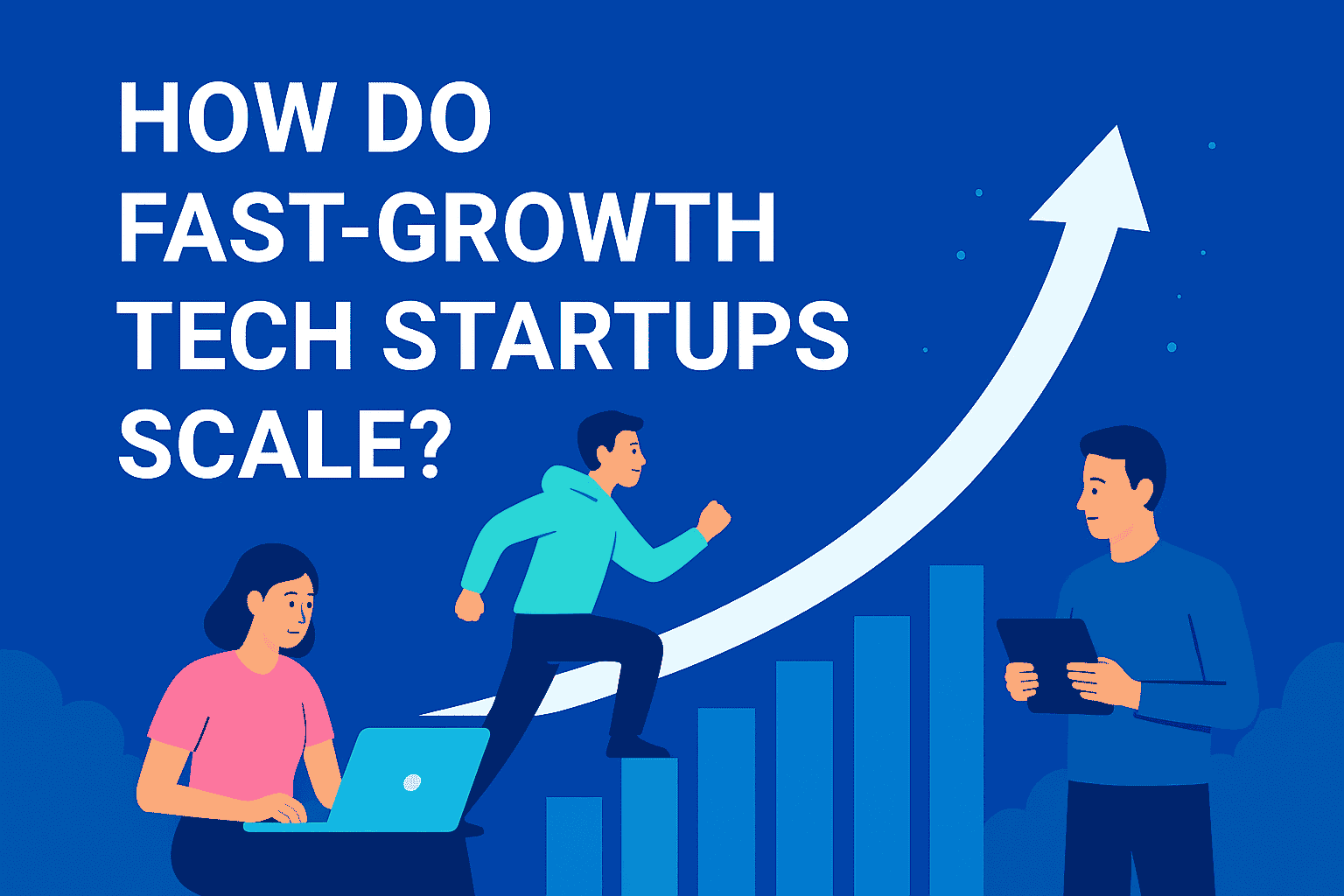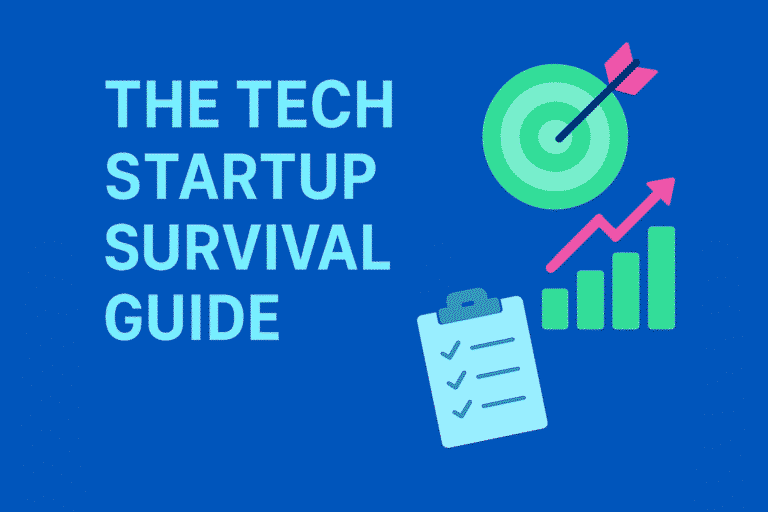What is a Scaleup Business?…
Approximately 10% of VC-funded startups successfully evolve into scaleups – that is companies with a sustainable business model that experiences rapid growth. However, it’s reported that only a fraction, suggested to be about 0.4% of all startups, go on to achieve significant scale, defined as reaching over $10 million in annual revenue within the first five years. Put another way, roughly 10% of startups that hit $1 million in annual revenue go on to scale up to $10 million. The primary challenges they face are often due to poor execution rather than a flawed business concept. This highlights the competitive and challenging nature of achieving significant growth and transitioning from startup to the scaleup stage.

Managing Growth
Scaling a B2B tech startup involves managing accelerated growth while maintaining quality and customer satisfaction. This must be balanced against overexpansion, which can lead to operational inefficiencies and a diluted focus. The scaleup stage is when a startup must invest in people, process and technology infrastructure that can handle increased demand without compromising service quality and performance. All growth businesses must seek to automate repetitive tasks to streamline operations and free up teams to focus on value creation activities. Scaling at a manageable pace will avoid many pitfalls, making it important to prioritise sustainable success over unnecessarily rapid expansion to ensure long-term goals.
Invest to Scale
This involves not only expanding the team and infrastructure but also ensuring that the marketing department aligns closely with the overall growth strategy to support expansion effectively. If you have ambitious growth plans for your B2B tech startup, then you must be prepared to increase your investment in marketing and sales in alignment with revenue targets. Claiming you want to grow and double revenue targets is just facile. Founders must resist the temptation to order new company branded clothing to massage the ego and instead focus on what the business needs. If you claim your startup is a scaleup but haven’t significantly increased investment in marketing, then you are not a scaleup and the failing new business revenue numbers will prove this.
Understanding the Growth Phase
The few fast-growth tech startups experiencing exponential increases in demand can face the risk of operational overload. The primary challenge is to scale up the operational backbone, which includes product delivery, onboarding, customer support and human resources. The trick is to do this without losing the quality that customers expect. The general approach for startups is to focus on building a scalable business model that can adapt to increased workloads without exponentially increasing resources and costs. This is why automation and technology are required to streamline processes and reduce the reliance on human intervention for routine tasks.
The Role of Marketing in a Scaleup
Marketing plays a pivotal role in managing the perceptions and expectations of both existing and new customers during periods of rapid growth. It’s not just about promoting the solution; it’s about communicating the company’s evolving capabilities and ensuring that the brand’s promise aligns with delivery. This involves several key strategies:
1. Educational Content and Thought Leadership
As your startup grows, marketing produces content that educates the market about the evolving aspects of the solution and how it remains superior despite the rapid growth. For example, detailed case studies and white papers can help in demonstrating credibility and capability, reassuring customers that quality remains uncompromised.
2. Customer Communication
Transparent communication becomes essential during scaling. Marketing must ensure that communication channels are open, with regular updates about how the company is performing and what changes customers can expect. Techniques such as email newsletters, webinars and even direct customer calls and in-person events become crucial.
3. Brand Consistency
As your business grows, expect to undergo rapid changes, while branding elements and messaging may be updated, it’s vital for marketing to maintain brand consistency across all channels. You must avoid customer confusion and reinforce brand values. As noted in Forbes, consistent branding across all marketing touch points can increase revenue by up to 23%.
Leveraging Technology and Automation
To handle increased demands, successful startups often implement advanced marketing automation tools. These tools help in segmenting the audience, personalising messages and managing large-scale campaigns without a corresponding increase in manpower. Automation in marketing not only helps in handling increased volume but also in maintaining precision in targeting, improving the overall efficiency of marketing efforts. Workflow tools, such as HubSpot, help manage increased volume and nurture target companies.
Aligning With Sales and Customer Support
Marketing must align with sales and customer support teams to ensure the customer journey is seamless from. This integration involves shared tools and platforms for customer relationship management (CRM) and regular cross-departmental meetings, so teams are unified regarding customer expectations and feedback. Founder teams must place importance on resourcing these functions adequately and working closely with them to execute plans, monitor results and adapt to evolving situations and market dynamics.
Case Studies and Learning from the Best
Examining how successful startups have managed their growth can provide valuable insights. For instance, Slack, initially a small startup, managed its growth through meticulous customer-focused marketing and constant engagement strategies that kept the user base well-informed and satisfied. Another example is HubSpot, which scaled its operations by heavily investing in customer education through its academy, helping users understand and better utilise their expanding suite of products. Consideration of what competitors and potential substitutes are doing and saying about you is also important. You may need to deposition competing products during sales engagements and update your messaging to enhance your differentiation if other propositions look too similar.
Are You Ready for Lift Off?
For B2B tech startups, scaling operations amidst rapid growth involves a delicate balance between expanding internal capabilities and managing external customer perceptions and expectations. Marketing, with its power to educate, engage and reassure, plays a crucial role in this balancing act. The small percentage of startups that do this well not only survive the growth phase but thrive, turning temporary growth into longer-term market penetration. This is extremely complex, especially for inexperienced tech founders with a bias towards technical operations but no real marketing and sales experience.
The Power of Focus
Staying focused on the core business during this time is critical, but what made you successful in the early stages may not be sufficient throughout the scaleup phase. Marketing will need to drive more awareness in the form of attention and engagement, as the rest of the business must maintain quality and satisfaction that matches the pace of your expansion. This comprehensive approach ensures that as your company grows, every part of the organisation stays aligned towards common goals. Do not underestimate the difficulty and importance of this stage as you push towards success. Founders must ensure their startup is adequately financed and resourced to scale or change expectations accordingly.
You may want to read: “Why B2B Tech Startups Must Invest in Marketing.”







